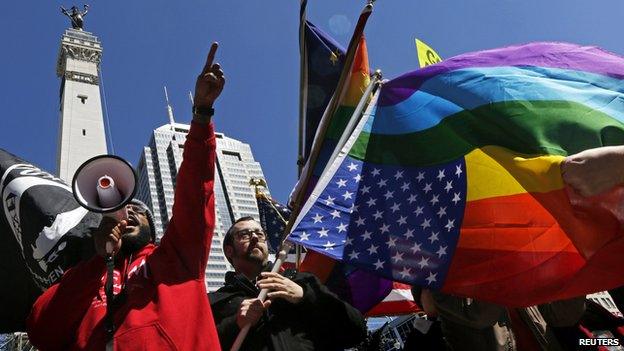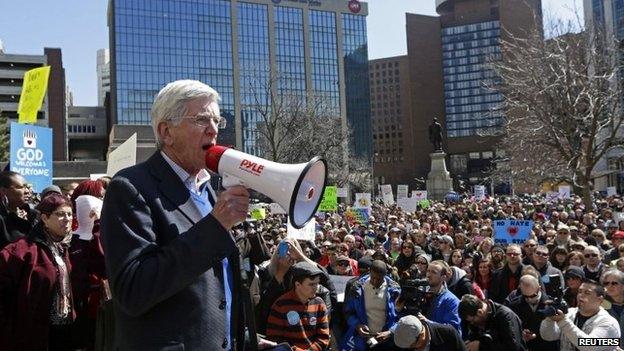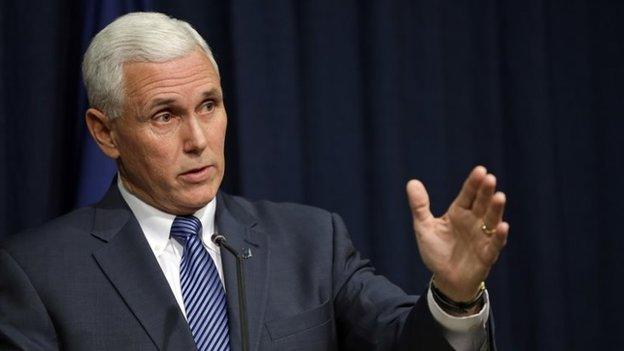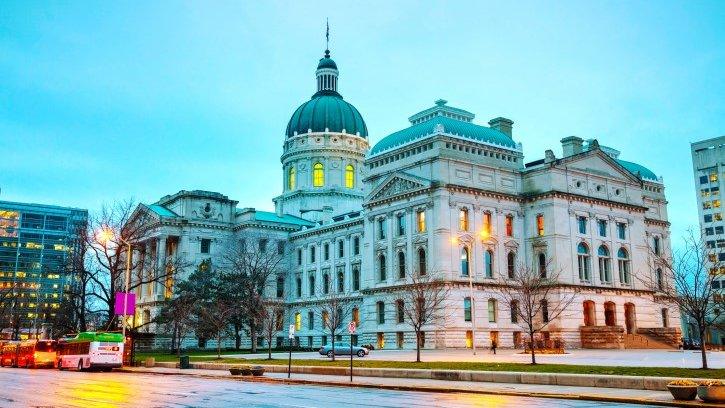Indiana to 'clarify' religious freedom law
- Published

More than 2,000 people gathered to protest the bill on Saturday, Reuters reported
Republican leaders in the Indiana state legislature say they are looking at ways to amend a controversial new "religious freedom" law.
The law has created a national outcry, with critics saying it could be used to discriminate against gays and lesbians.
The Religious Freedom Restoration Act (RFRA) protects businesses from state laws that "substantially burden" their religious beliefs.
There have been calls to boycott the state, in response.
Connecticut has banned state-funded travel to Indiana, and Apple CEO Tim Cook has condemned the measure.
Indiana Governor Mike Pence signed the legislation into law last week, but some of his fellow Republicans are already seeking to make amendments.
Indiana House Speaker Brian Bosma and Senate President Pro Tem David Long said that they will add additional language to the law to make it clear that it doesn't allow for discrimination against gays and lesbians.
"What we had hoped for with the bill was a message of inclusion, inclusion of all religious beliefs," Mr Bosma said.
"What instead has come out as a message of exclusion, and that was not the intent."

Is Indiana law anti-gay?

critics say yes, it means a florist could refuse to provide flowers for a gay wedding, for example
but supporters say it is about religious freedom not exclusion
20 states have similar laws but they don't all go as far as Indiana's in giving protection to businesses
and some of those states have other laws that prevent discrimination against minorities

Mr Long stressed that Indiana's law is based on the federal government's Religious Freedom Restoration Act of 1993, which has survived court challenges.
Mr Pence defended the law on television on Sunday but refused at least five times to say if it allows businesses to deny services to gays and lesbians.
"This is not about discrimination, this is about empowering people to confront government overreach," he told ABC's George Stephanopoulos.
"The issue here is, you know, is tolerance a two way street or not?" Mr Pence said.
A chorus of criticism is growing, with the White House and companies such as Wal-Mart and Angie's List denouncing the law.
Apple CEO Tim Cook, who is openly gay, said his company was "deeply disappointed in Indiana's new law". Some companies have said that they are halting any expansion plans in the state.
In a move directed at the Indiana law, Connecticut Governor Dan Malloy signed an executive order on Monday that bans state-funded travel to states that have laws similar to Indiana's controversial law, but that do not protect gays and lesbians from discrimination.
"When new laws turn back the clock on progress, we can't sit idly by. We are sending a message that discrimination won't be tolerated," Mr Malloy said on Twitter.

More than 2,000 people gathered to protest the bill on Saturday, Reuters reported

Democratic Indiana State Representative Ed Delaney speaks to demonstrators
The mayor of Indianapolis, which is about to host the final rounds of the nation's largest collegiate basketball tournament, has reaffirmed the city's protection of gays and lesbians.
Mayor Greg Ballard, a Republican, issued an executive order, external affirming that any person or institution receiving public funds would have to abide by the city's human rights ordinance, which protects minority groups.
While many states have passed legislation similar to Indiana's, critics say it goes further because it empowers corporations to discriminate, with no state protection for gays and lesbians.
When asked whether he would consider extending civil rights protections to gays and lesbians in Indiana, Mr Pence said: "I will not push for that."
- Published27 March 2015

- Published27 March 2015
